Jean de Florette Blu-ray Movie
HomeJean de Florette Blu-ray Movie 
Shout Factory | 1986 | 121 min | Rated PG | No Release Date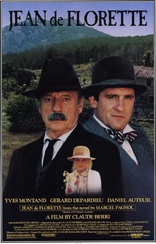
Price
Movie rating
7.8 | / 10 |
Blu-ray rating
| Users | 0.0 | |
| Reviewer | 4.0 | |
| Overall | 4.0 |
Overview
Jean de Florette (1986)
The first of two parts of the classic Marcel Pagnol story set in southeast France in the mid 1920s. In a small provencal village, where water is scarce and the earth dry, only one piece of property possesses an underground spring to irrigate the soil--and the wily, greedy Cèsar will do anything to get hold of it. His dreams seem on the verge of coming true when the owner (with a little help from Cèsar) dies unexpectedly. But then Jean Cadoret, an outsider who inherits the farm, arrives with the intention of settling down and cultivating the land with his good-hearted wife Aimee and young daughter Manon. Jean, a hunchback and sensitive dreamer, glories in his new life while Cèsar and his nephew Ugolin secretly decide to stop up the spring so his plans will fail. The good-hearted Jean, too naive to imagine that anyone would sabotage him, struggles fruitlessly to make his garden bloom. His continual failure erodes his spirit, setting the stage for a tragedy with consequences for all.
Starring: Yves Montand, Gérard Depardieu, Daniel Auteuil, Margarita Lozano, Elisabeth DepardieuDirector: Claude Berri
| Foreign | Uncertain |
| Drama | Uncertain |
| Romance | Uncertain |
Specifications
Video
Video codec: MPEG-4 AVC
Video resolution: 1080p
Aspect ratio: 2.36:1
Original aspect ratio: 2.35:1
Audio
French: DTS-HD Master Audio 5.1 (48kHz, 24-bit)
French: DTS-HD Master Audio 2.0 (48kHz, 24-bit)
Subtitles
English
Discs
50GB Blu-ray Disc
Single disc (1 BD)
Playback
Region A (B, C untested)
Review
Rating summary
| Movie | 4.5 | |
| Video | 4.0 | |
| Audio | 4.0 | |
| Extras | 0.5 | |
| Overall | 4.0 |
Jean de Florette Blu-ray Movie Review
Water, water, everywhere. . .
Reviewed by Jeffrey Kauffman January 26, 2015Despite rather august achievements in a variety of media, Marcel Pagnol is strangely unremembered or at least underappreciated today. A number of Pagnol’s novels like La Gloire de mon père and Le château de ma mère have been acclaimed as undisputed masterpieces, while his trilogy of plays located in the evocative port of Marseilles provided the source material for the Broadway musical Fanny (the show that gave future Carol Brady, Florence Henderson, one of her first big breaks), which in turn became the largely nonmusical film Fanny in 1961 (and later a remake by Daniel Auteuil). Pagnol’s translations of Shakespeare into French are still considered among the best ever done, even if some occasionally criticize them for being quirky. But Pagnol was also a filmmaker, and while his oeuvre doesn’t rise to the heights of his contemporaries Jean Renoir or Jean Cocteau, Pagnol created some inarguably memorable characters and stories in this medium as well. He in fact filmed all three parts of his Marseilles triptych, with Fanny and Marius appearing in 1931, followed five years later by César. In 1952 Pagnol got into skirmishes with his distributor over his four hour opus Manon des Sources, and the film was radically cut against its creator’s wishes. Though it took him about a decade after that debacle to recast his vision in a new medium, in 1963 Pagnol brought out his two part novel L'Eau des Collines, a convoluted, almost Edna Ferber-esque multigenerational saga that detailed the exploits of a scheming Provençal family whose plans to start growing carnations (carnations!) on an arid field shortly after World War I brings them into conflict with a neighbor whose property contains a supposedly secret spring. In 1986, Claude Berri filmed both parts of L’Eau des Collines simultaneously, releasing the films separately as Jean de Florette and Manon des Sources, which became Manon of the Spring in its English iteration.
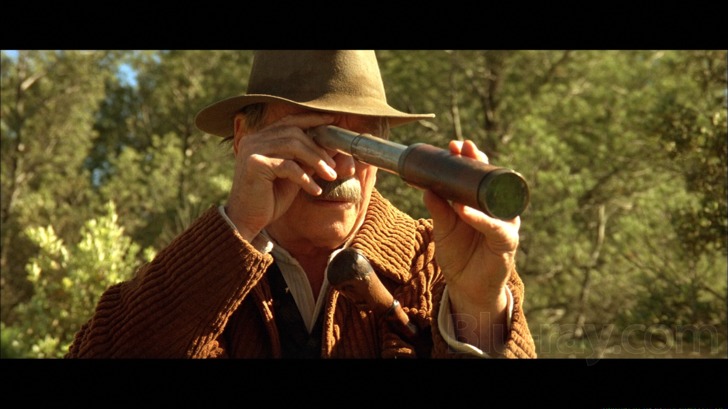
For anyone who thinks water rights might not provide enough drama to sustain a film, a one word response might be enough to disprove that thesis: Chinatown (that's a joke, in case humor doesn't translate over the interwebs). Of course Jean de Florette has none of the political subtext of the Polanski film, and instead trafficks in a certain irony derived from the fact that naive heir Jean Cadoret (Gérard Depardieu) takes possession of his somewhat dilapidated family farm in Provence thinking that he will become a gentleman farmer in the more congenial French countryside away from an oppressive urban atmosphere.
The irony of course is that Jean has wandered into a web of deceit and duplicity beyond his wildest imagination courtesy of his neighbors César (Yves Montand) and Ugolin Soubeyran (Daniel Auteuil). Ugolin, a seemingly slightly developmentally disabled nephew of César’s, has returned from World War I with the apparently mad scheme to grow carnations on the Soubeyran property. When his first crop fetches the handsome sum of 20 cents at the local market, even a skeptical César is convinced that flower growing might provide substantial income, and the two decide to move ahead with the plan.
Unfortunately, there’s not enough water on their property, so César decides to offer his neighbor, a contentious elder named Pique-Bouffigue (Marcel Champel), a substantial sum for land that contains a spring which has been blocked for years but which César feels can provide more than ample irrigation with a little elbow grease. Unfortunately, Pique-Bouffigue will have none of it, and in the ensuing scuffle he’s mortally injured. That is the first clue as to how viciously sanguine César is about realizing his goal. He’s not in the slightest bit discombobulated by Pique- Bouffigue’s death and instead starts machinating with Ugolin about how to deal with his neighbor’s heirs.
César writes to find out what happened to Pique-Bouffigue’s sister, a woman with whom César evidently shared some history, in an apparently tangential plot point which becomes central to the tragic nature of what in essence turns into a trangsgenerational revenge tale. That woman has also just recently passed away, and Jean is her son. Jean is afflicted with being a hunchback, but he is a genial man with a rather sunny disposition. Despite Ugolin’s attempts to damage Jean’s newly inherited property so that Jean won’t want to take up residence there, Jean does indeed move in, with plans to overcome easy water access with a perhaps mad gambit involving rabbits.
Jean de Florette plays out with a certain rustic inexorableness, as both César and Ugolin plot against the clueless Jean. What plays ironically against this village villainy, though, is director Claude Berri’s impeccable visual sense, something that infuses the film with an almost travelogue aspect. Of course, the scenery may be beautiful, but the scheming human element at the core of the story is both reprehensible and oddly compelling. The performances are beautifully nuanced, with Montand bringing an almost casual evil to César, and Auteuil making Ugolin both sympathetic and dastardly, a rather hard tightrope to walk. Perhaps one of the most amazing things about Jean de Florette is that as involving and devastating as it is by itself, it turns out to be just the first part of the story.
Jean de Florette Blu-ray Movie, Video Quality 
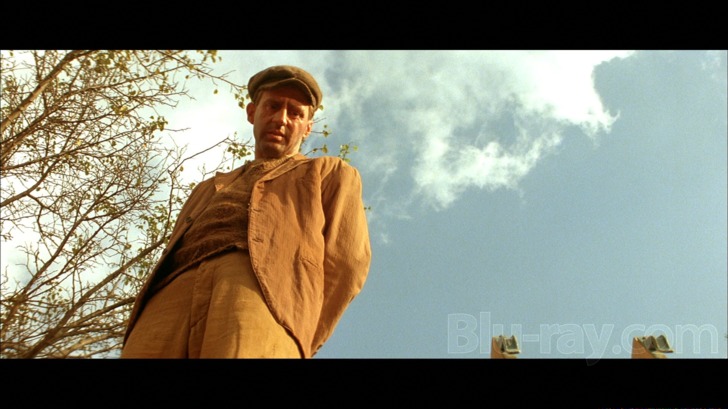
Jean de Florette is presented on Blu-ray courtesy of Shout! Factory with an AVC encoded 1080p transfer in 2.36:1. The buttery cinematography Bruno Nuytten looks substantially better on this Blu-ray than it did on the somewhat lackluster old DVD release of the film, and the suffused saffron coloring of many shots is nicely reproduced. In fact the entire color space looks really good, with nice reproductions of the bright reds of the carnations, the dusty ambience of the water starved fields, and things like the gorgeous ochre of Jean's family home. Things are so filled with diffuse light that typically midrange and wide shots have a pretty gauzy appearance, but close-ups offer good clarity and substantial fine detail. Grain is generally very natural and organic looking, though in just a couple of moments it clumps strangely. There are no issues with image instability nor any signs of intrusive digital manipulation of the image harvest.
Jean de Florette Blu-ray Movie, Audio Quality 
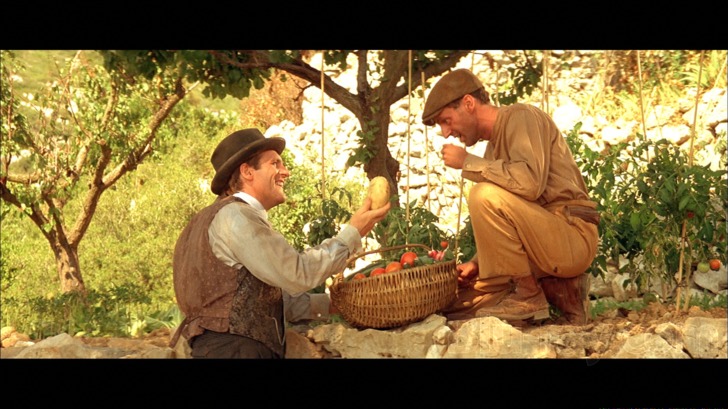
Jean de Florette features lossless DTS-HD Master Audio mixes in both 2.0 and 5.1 iterations. The 5.1 repurposing has just a very slightly phased quality at times, but overall sounds fairly organic, especially with regard to ambient environmental sounds and Jean-Claude Petit's score (which quotes liberally from Verdi). Dialogue is very cleanly presented and there are no problems of any kind to address in this review.
Jean de Florette Blu-ray Movie, Special Features and Extras 
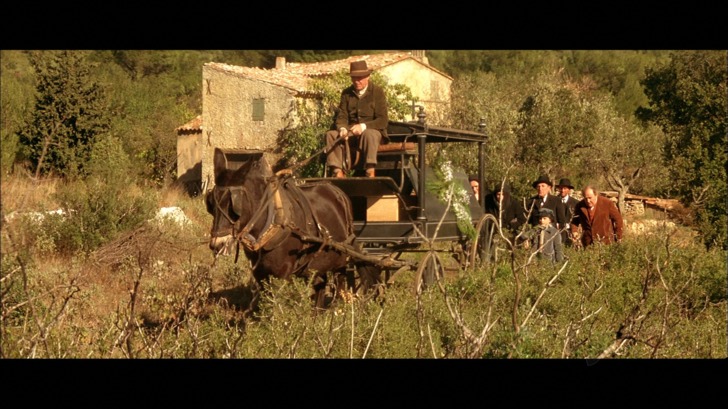
- Trailer (1080p; 1:27)
Jean de Florette Blu-ray Movie, Overall Score and Recommendation 
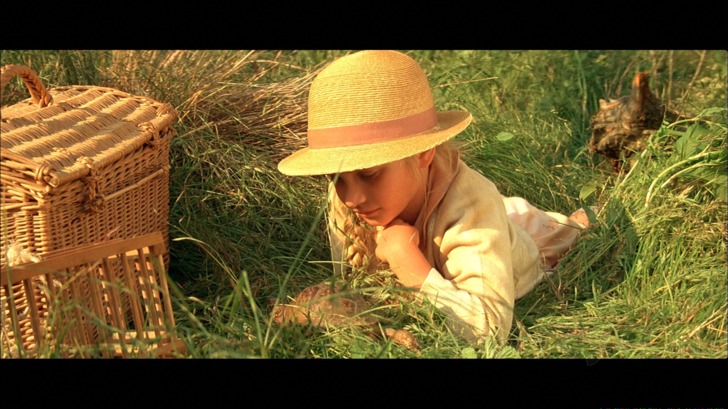
Jean de Florette is almost a sinister film in that it sucks the viewer in with an unbelievably scenic location, only to deliver the death knell once you start to get to know the natives. Highlighted by incredible performances and a beautifully wrought story which sees its fulfilment in Manon of the Spring, Jean de Florette may well be the most beautiful film about the ugliness of men's souls ever committed to celluloid. While lacking any substantial supplements, technical merits are very strong on this release and Jean de Florette comes Highly recommended.
Similar titles
Similar titles you might also like
(Still not reliable for this title)

Manon of the Spring
Manon des sources
1986

Life of Riley
Aimer, boire et chanter
2014

Madame Bovary
1991

Le beau Serge
1958

Winter Sleep
Kış Uykusu
2014

One Sings, the Other Doesn't
L'une chante, l'autre pas
1977

Happy Together
春光乍洩 / Chun gwong cha sit
1997

Summer Interlude
Sommarlek
1951

Diary of a Country Priest
Journal d'un curé de campagne
1951

César et Rosalie
Cesar & Rosalie
1972

The World
世界 / Shijie
2004

Betty Blue
37°2 le matin | Director's Cut
1986

Claire's Knee
Le genou de Claire
1970

Masculin Féminin
1966

Children of Paradise
Les enfants du paradis
1945

Mouchette
1967

Lola
1961

La vie de Jésus
The Life of Jesus
1997

A Day in the Country
Partie de campagne
1946

Jules and Jim
Jules et Jim
1962

